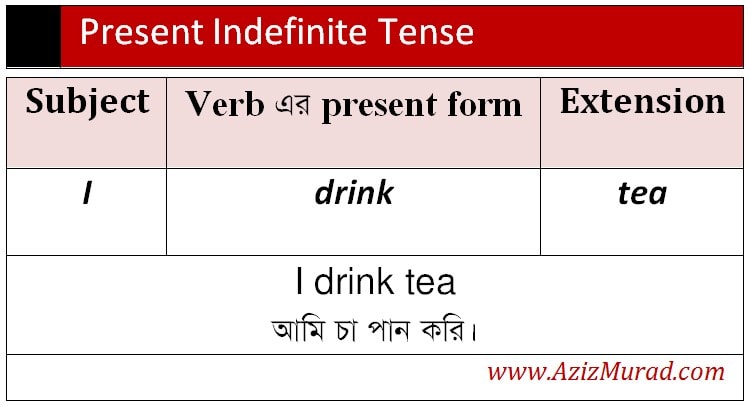- Should Have এর ব্যবহার - May 22, 2022
- May Have এর ব্যবহার - May 5, 2022
- Will এর ব্যবহার - March 29, 2022
Table of Contents
Tense এর গঠন প্রণালি, Tense এর ব্যবহার, Tense মনে রাখার সহজ উপায়
Tense এর গঠন প্রণালি, Tense এর ব্যবহার, Tense মনে রাখার সহজ উপায় জানতে আর্টিকেলটি পড়ুন, জানুন এবং শিখুন। আমাদের অনলাইন ইংলিশ লাইব্রেরী থেকে ইংলিশ লার্নিং eBook ডাউনলোড করে নিন। আর্টিকেলটি পড়তে থাকুন আর্টিকেল এর শেষে লিংক পেয়ে যাবেন।
In this article I am trying to give you an idea about Tense. This article covers Tense in detailed (12 kinds of tense) with their definitions, structures and Examples.
What is Tense? In short, tense is the time of action what we do.
Tense কাকে বলে? সাধারণত কাজ করার সময় কে Tense বলে।
Tense কত প্রকার ও কি কি?
Tense প্রধানত তিন প্রকার। যেমনঃ 1. Present Tense 2.Past Tense 3. Future Tense.
প্রত্যেক প্রকার Tense কে আবার চার ভাগে ভাগ করা হয়েছে।পড়তে থাকুন আমি বিস্তারিত আলোচনা করেছি……..
Now I have explained these with definitions, structures and examples.
Present Tense (বর্তমান কাল)
যে কাজ বর্তমান কালে সম্পন্ন হয় বা হয়ে থাকে বোঝায় তাকে Verb-এর Present Tense বা বর্তমান কাল বলে।Present Tense চার প্রকার। যেমনঃ
- Present Indefinite
- Present Continuous
- Present Perfect
- Present Perfect Continuous
1. Present Indefinite Tense কাকে বলে?
বর্তমান কালে কোনাে কাজ সাধারণভাবে হয় বা হয়ে থাকে, এরূপ বােঝালে verb-এর Present indefinite Tense বলে।চিরন্তন সত্য, নিকট ভবিষ্যত, অভ্যাস, প্রকৃতি বােঝাতে Present Indefinite Tense হয়। যেমনঃ I get up early in the morning everyday. আমি প্রতিদিন খুব সকালে ঘুম থেকে উঠি।
Present Indefinite Tense এর গঠন প্রণালি

Positive: Subject + মূল Verb + Extension.
- I/we/you/they play cricket. আমি ক্রিকেট খেলি।
- He/she/it/Sihab plays cricket. সে ক্রিকেট খেলে।
Negative: Subject + do not/does not + মূল Verb + Extension.
- I/we/you/they do not play cricket. আমি ক্রিকেট খেলি না।
- He/she/it/Sihab does not play cricket. সে ক্রিকেট খেলে না।
More Examples:
- I play cricket.
- I do not play football.
- He plays football.
- He does not play badminton.
- I get up early in the morning.
- I do not get up late in the morning.
- He goes to college regularly.
- He does not go to college irregularly.
- Mother recites the Holy Qurarn every morning.
- Mother does not recite poem in the morning.
- They take exercise regularly.
- We do not take exercise irregularly.
- We finish our homework in time.
- We do not finish our homework after the time.
- We pray five times daily.
- We do not pray less than five times daily.
- We eat three times daily.
- We do not eat more than three times daily.
- I go to bed at 11:00 pm.
- I do not go to bed before 11:00 pm.
Important Articles for you:
1. How to learn স্পিকিং English
2. How to Speak English with Continuous Tense
3. ইংরেজীতে কথা বলার জন্য গুরুত্বপূর্ণ Verb এর লিস্ট
2. Present Continuous Tense কাকে বলে?
বর্তমান কালে কোনাে কাজ হচ্ছে বা চলছে এরূপ বােঝালে Verb-এর Present Continuous Tense বলে।
Present Continuous Tense এর গঠন প্রণালি

Positive: Subject + am/is/are + মূল Verb + ing + Extension.
- I am drinking tea now. আমি এখন চা পান করছি/করতেছি।
- He/she/it is taking rest. সে বিশ্রাম নিচ্ছে।
- We/they/you are driving a car. আমরা একটি গাড়ী চালাচ্ছি।
Negative: Subject + am not/is not/are not + মূল Verb + ing + Extension.
- I am not drinking drinking tea. আমি চা পান করছি না।
- He/she/it is not walking in the field. সে মাঠে হাটছেনা।
- We/they/you are not working today. আমরা আজ কাজ করছি না।
More Examples:
- I am drinking tea now.
- I am not drinking coffee now.
- I am listening to the radio right now.
- I am not listening to the radio right now.
- He is reading a book now.
- He is not reading a story book now.
- They are playing badminton at this moment.
- They are not playing cricket at the moment.
- We are planning to study for the debate.
- We are not planing to study abroad.
- He is trying to pay his full concentration to his study.
- He is not trying to pay his attention to the game.
3. Present Perfect Tense কাকে বলে?
বর্তমান কালে কোনাে কাজ এই মাত্র শেষ হয়েছে কিন্তু তার ফল এখনাে বর্তমান আছে, এরূপ বােঝালে verb-এর Present Perfect Tense বলে।
Present Perfect Tense এর গঠন প্রণালি

Positive: Subject + have/has + Verb-এর Past Participle + Extension.
- I/we/you/they have started the work. আমি কাজটি শুরু করেছি/করিয়াছি।
- He/she/It/Sihab has gone to market. সে বাজারে গিয়েছে।
Negative: Subject + have not /has not + Verb-এর Past Participle + Extension.
- I/we/you/they have not started the work. আমি কাজটি শুরু করিনি।
- He/she/It/Sihab has not gone to market. সে বাজারে যায়নি।
Example:
- I have taken breakfast.
- I have not taken breakfast.
- We have drunk tea.
- We have not drunk tea.
- He has written a letter.
- He has not written a letter.
- They have completed the work.
- They have not completed the work.
- Safia has made a mistake.
- Safia has not made a mistakes.
- Jerin has drawn a flower.
- Jerin has not drawn a flower.
- Sanjida has broken the glass.
- Sanjida has not broken the glass.
4. Present Perfect Continuous Tense কাকে বলে?
বর্তমান কালে কোনাে কাজ পূর্ব থেকে আরম্ভ হয়ে এখনাে হচ্ছে বা চলছে এরূপ বােঝালে verb-এর Present Perfect Continuous Tense বলে।
Present Perfect Continuous Tense এর গঠন প্রণালি

Positive: Subject + have been/has been + মূল Verb + ing + Extension.
- I/we/you/they have been waiting here for half an hour. আমি আধাঘন্টা ধরে এখানে অপেক্ষা করছি।
- He/she/it/Mainul has been working on freelance since last year. সে গত বছর ধরে ফ্রিল্যান্সে কাজ করছে।
Negative: Subject + have been/has been + মূল Verb + ing + Extension.
- I/we/you/they have not been waiting here for half an hour. আমি আধাঘন্টা ধরে এখানে অপেক্ষা করছি না।
- He/she/it/Mainul has not been working on freelance since last year. সে গত বছর ধরে ফ্রিল্যান্সে কাজ করছে না।
More Examples:(Positive & Negative)
- I have been reading a book for an hour.
- I have not been reading a book for two hours
- Salma has been waiting there for me since morning.
- Salma has not been waiting here for me since afternoon.
- They have been doing the work for five days.
- They have not been doing the work for seven days.
- We have been studying in your college for two years.
- We have not been studying in your college for five years.
- He has been working in this company for five years.
- He has not been working in this company for ten years.
- You have been experiencing the project for three months.
- You have not been experiencing the project for four years.
- She has been sewing the clothes for half an hour.
- She has not been sewing the clothes for two days.
আরও পড়ুন:
1. গুরুত্বপূর্ণ English Phrase & Idioms (বাংলা অর্থসকারে)।
2. Sentence কাকে বলে? Sentence এর অংশ সমূহ ও এর প্রকারভেদ।
আমাদের অনলাইন ইংলিশ লাইব্রেরী
Past Tense (অতীত কাল)
যে কাজ অতীত কালে সম্পন্ন হয়েছিল বা ঘটেছিল বুঝায় তাকে Verb-এর Past Tense বা অতীত কাল বলে।Past Tense চার প্রকার। যেমনঃ
- Past Indefinite
- Past Continuous
- Past Perfect
- Past Perfect Continuous
5. Past Indefinite Tense কাকে বলে?
অতীত কালে কোনাে কাজ সাধারণভাবে হয়েছিল এরূপ বােঝালে verb-এর Past Indefinite Tense বলে।
Past Indefinite Tense এর গঠন প্রণালি:
Positive: Subject + মূল verb-এর Past form + Extension.
- I drank tea last morning. (Drink-drank-drunk)
- I/we/you/they/he/she/it/Sakib saw the job advertisement yesterday.(for any subject)
Negative: Subject + did not + মূল verb-এর Present form + Extension.
- I did not drink tea last morning
- I/we/you/they/he/she/it/Sakib did not see the job advertisement yesterday.(for any subject)
More Examples:
- I saw a nice bird yesterday.
- I did not see a nice bird yesterday.
- They arrived home safely last night.
- They did not arrive home safely last night.
- My father came here last month.
- My father did not come here last month.
আরও পড়ুনঃ
1. ইংরেজীতে কথা বলার জন্য গুরুত্বপূর্ণ Phrase & Idioms
6. Past Continuous Tense কাকে বলে?
অতীত কালে কোনাে কাজ হচ্ছিল বা চলছিল এরূপ বােঝালে verb-এর Past Continuous Tense বলে।
Past Continuous Tense এর গঠন প্রণালি:
Positive: Subject + was/were + মূল Verb + ing + Extension.
- I was talking with my mother.
- We/they/you were reading the newspaper.
- He/she/it/Jobair was cleaning the house.
Negative: Subject + was not/were not + মূল Verb + ing + Extension.
- I was not talking with my mother.
- We/they/you were not reading the newspaper.
- He/she/it/Jobair was not cleaning the house.
More Examples:
- I was reading a story book last morning.
- I was not reading a history book last morning.
- They were making a noise.
- They were not making a peaceful environment.
- We were making fun.
- We were not making violence.
- He was taking his medicine.
- He was not taking his meal.
Important articles for you:
1. Parts of Speech কাকে বলে ও প্রকারভেদ।
2. Adjective কাকে বলে? প্রকারভেদ ও এর ব্যবহার।
7. Past Perfect Tense কাকে বলে?
অতীত কালে সংঘটিত দুটি কাজের মধ্যে পূর্বে সংঘটিত কাজটির verb-এর Past Perfect Tense বলে এবং পরে সংঘটিত কাজটির Verb-এর Past Indefinite Tense হয়।
Past Perfect Tense এর গঠন প্রণালি:
Positive: Subject + had + মূল Verb-এর Past Participle + Extension.
- The class had started before I reached the college.
- I/we/you/they/he/she/it/Sohan had finished the work before the supervisor came.
Negative: Subject + had not + মূল Verb-এর Past Participle + Extension.
- The class had not started before I reached the college.
- I/we/you/they/he/she/it/Sohan had not finished the work before the supervisor came.
More Examples:
- The patient had died before the doctor came.
- The patient had not died before the the doctor came
- My brother had gone out before you arrived here.
- My brother had not gone out before you arrived here.
- The students had stood up before the teacher entered the classroom.
- The students had not gone out before the teacher came from the class.
8. Past Perfect Continuous Tense কাকে বলে?
অতীত কালে সংঘটিত কাজটি কিছু সময় যাবত চলছিল এরূপ বােঝালে verb-এর Past Perfect Continuous Tense বলে।
Past Perfect Continuous Tense এর গঠন প্রণালি:
Positive: Subject + had been + মূল Verb + ing + Extension.
- I had been speaking English for 7 years.
- I/we/you/they/he/she/it/Jisan had been working in this company for 2 years.
Negative: Subject + had not been + মূল Verb + ing + Extension.
- I had not been speaking English for 7 years.
- I/we/you/they/he/she/it/Jisan had not been working in this company for 2 years.
More Examples:
- I had been waiting for you for an hour.
- I had not been waiting for you for half an hour.
- They had been watching the movie for two hours.
- They had not been watching the movie for four hours.
- We had been walking in the forest for 30 minutes.
- We had not been walking in the forest for two hours.
- He had been suffering from fever since last Sunday.
- He had not been suffering from dengue since last Monday
- You had been writing the story since last month.
- You had not been writing the poem since last month.
- I have been feeling sick since last Monday
- I have not been feeling sick since last Friday.
Future Tense (ভবিষ্যৎ কাল)
ভবিষ্যৎ কালে কোনো কাজ সম্পন্ন হবে বুঝলে তাকে Verb-এর Future Tense বা ভবিষ্যৎ কাল বলে। Future Tense চার প্রকার। যেমনঃ
- Future Indefinite
- Future Continuous
- Future Perfect
- Future Perfect Continuous
9. Future Indefinite Tense কাকে বলে?
ভবিষ্যৎ কালে কোনাে কাজ সাধারণভাবে সংঘটিত হবে এরূপ বােঝালে Verb-এর Future Indefinite Tense বলে।
Future Indefinite Tense এর গঠন প্রণালি:
Positive: Subject + shall/will + মূল Verb + Extension.
- I/we/you/they/he/she/it/Sabiha will go to Dhaka tomorrow.
- ( Now, “will” is used for any subject for general purpose in future tense)
Negative: Subject + shall not/will not + মূল Verb + Extension.
- I/we/you/they/he/she/it/Sabiha will not go to Dhaka tomorrow.
- ( Now, “will not” is used for any subject for general purpose in future tense)
More Examples:
- I will go to Dhaka tomorrow.
- I will not go to Dhaka tomorrow.
- He will buy a new shirt next Saturday.
- He will not buy a new shirt next Sunday.
- They will come to visit me next Friday.
- They will not come to visit me next Monday
- You will take a rest if you feel tired.
- You will not take a rest if you don’t feel tired.
- She will sing a song at the stage in college program.
- She will not sing a song at the stage in college program.
- Mother will always look after the children.
- Mother will not always look after the children.
10. Future Continuous Tense কাকে বলে?
ভবিষ্যৎ কালে কোনাে কাজ হতে থাকবে বা চলতে থাকবে বােঝালে verb-এর Future Continuous Tense বলে |
Future Continuous Tense এর গঠন প্রণালি:
Positive: Subject+ shall be/will be+ মূল Verb + ing + Extension.
- I will be writing.
- I/we/you/they/he/she/it/Sajib will be watching the world cup match.
Negative: Subject+ shall not be/will not be+ মূল Verb + ing + Extension.
- I will not be writing.
- I/we/you/they/he/she/it/Sajib will not be watching the world cup match.
More Examples:
- He will be sleeping.
- He will no be sleeping.
- You will be drinking tea.
- You will not be drinking coffee.
- She will be playing Ludu.
- She will not be playing Ludu.
- Farmers will be cultivating crops.
- Farmers will not be cultivating crops
- I will be going to University next morning.
- I will not be going to University next morning.
- He will be speaking English in the public meeting.
- He will not be speaking English in the public meeting.
- They will be learning computer after the exam.
- They will not be learning computer before the exam.
- Father will be taking a rest after finishing the work.
- Father will not be taking a rest before finishing the work.
11. Future Perfect Tense কাকে বলে?
ভবিষ্যৎকাল এর কোন নির্দিষ্ট সময়ের মধ্যে বা নির্দিষ্ট সময়ের আগে কোন কাজ শেষ হয়ে থাকবে বোঝালে Verb-এর Future Perfect Tense বলে।
Future Perfect Tense এর গঠন প্রণালি:
Positive: Subject+shall have/will have+ মূল Verb-এর Past Participle + Extension.
- I will have completed my project.
- I/we/you/they/he/she/it/Rakib will have written the E-mail.
Negative: Subject+shall not have/will not have+ মূল Verb-এর Past Participle + Extension.
- I will not have completed my project.
- I/we/you/they/he/she/it/Rakib will not have written the E-mail.
More Examples:
- I will have finished the work.
- I will not have finished the work.
- She will have read the story.
- She will not have read the story.
- They will have taken dinner.
- They will not have taken dinner.
- We will have learnt English.
- We will not have learnt English.
- He will have arrived at the airport by this time.
- He will not have arrived at the airport by this time.
- They will have finished the project.
- They will not have finished the project.
12. Future Perfect Continuous Tense কাকে বলে?
ভবিষ্যৎ কালে কোনাে কাজ কিছু সময় ধরে হতে থাকবে বা চলতে থাকবে বােঝালে verb-এর Future Continuous Tense বলে।
Future Perfect Continuous Tense এর গঠন প্রণালি:
Positive: Subject+ shall have been/will have been+ মূল Verb + ing + Extension.
- I will have been learning my lesson.
- I/we/you/they/he/she/it/Rahat will have been building his new home.
Negative: Subject+ shall not have been/will not have been+ মূল Verb + ing + Extension.
- I will not have been learning my lesson.
- I/we/you/they/he/she/it/Rahat will not have been building his new home.
More Examples:
- I will have been playing football.
- I will not have been playing cricket.
- He will have been watching the television.
- He will not have been watching the television.
- They will have been finishing the work.
- They will not have been finishing the work.
- She will have been making cake.
- She will not have been making cake.
- Mother will have been cooking rice.
- Mother will not have been cooking rice.
- Father will have been reading the newspaper.
- Father will not have been reading the newspapers
- Brother will have been writing an article for his new website.
- Brother will not have been writing a poem for his new website.
প্রয়োজনীয় লিংকঃ
আমাদের ফ্রি অনলাইন ইংলিশ লাইব্রেরীর সকল eBook পড়ুন ও ডাউনলোড করুন।
Source:
- Self study
- Online sources




